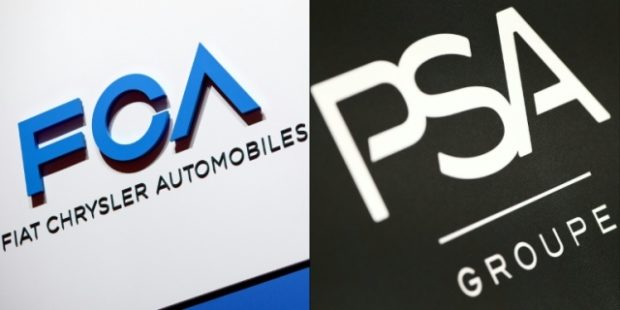
The merger is seen as crucial for the two groups to undertake the investment needed to transition to clean car technology. Image: AFP/HAROLD CUNNINGHAM, DANIEL ROLAND.
Shareholders gave their blessing on Monday, Jan. 4, to a merger of carmakers PSA and Fiat Chrysler that catapults the new company “Stellantis” into fourth place globally, as the auto industry races to make the transition to cleaner cars.
Merger resolutions were approved almost unanimously at PSA’s annual shareholder meeting, said PSA chief Carlos Tavares, who will take the helm of the new company.
Fiat Chrysler shareholders later gave similar backing and the two groups said the merger would be completed by Jan. 16.
John Elkann, Fiat chairman and scion of Italy’s storied Agnelli family, will retain his role at Stellantis in what he called “a challenging era.”
“The coming decade will redefine mobility: we are intent on playing a leading role in building this new future,” Elkann said after the vote.
The green light from shareholders had been widely considered a given, coming two weeks after the European Commission gave conditional approval to the deal announced in late 2019.
The 50-50 tie-up, which was delayed by the COVID-19 pandemic, is seen as crucial for the two groups to afford massive investments needed in clean car technology.
It also allows Fiat to strengthen its presence in its key European markets, while the French group will gain a foothold in the United States.
“It’s a very good operation,” the EU’s internal markets commissioner Thierry Breton told French TV channel BFM Business, welcoming the emergence of “very large European groups.”
“The capacity to mutualize investments in research and development is very important,” he said. But the market was undergoing transformation “and we mustn’t be left behind.”
“This merger is a matter of survival for both Fiat and PSA,” said Giuliano Noci, a professor of strategy at Milan Business School.
The accord combines PSA’s Peugeot, Citroen, Opel and other brands with Fiat Chrysler’s stable that includes their namesake brands as well as Jeep, Alfa Romeo and Maserati.
By number of cars sold, Stellantis and its workforce of over 400,000 will now rank behind Volkswagen, the Renault-Nissan-Mitsubishi alliance, and Toyota.
But it will be the third-largest automaker by revenue, a testament to efforts to convince buyers to pay out more for their cars.
Weathering COVID
“Only the most agile, with a Darwinian spirit, will survive,” PSA chief Tavares warned last November.
The European Commission had been worried the merger could affect competition in Europe’s lucrative van market, with PSA and Fiat Chrysler together accounting for 34% of market share.
To assuage those concerns, the commission said PSA would continue an agreement with Toyota to manufacture vans to be sold under the Japanese brand in Europe.
The disruptions wrought by COVID-19, which ground manufacturing to a halt for several weeks in early 2020, forced PSA and Fiat to change the terms of their tie-up to ensure it remained a merger of equals.
FCA agreed to lower an exceptional dividend for its shareholders, while PSA agreed to share its 46% stake in the French automotive equipment maker Faurecia with all shareholders of the new company, rather than just its own as agreed previously.
The two companies have shown relative resilience in the face of the pandemic.
Fiat Chrysler posted a net profit of €1.2 billion (around $1.5 billion or P70.8 billion) for the third quarter, compared with losses of €1.04 billion in the second quarter, when auto sales plummeted as much of the world was in coronavirus lockdown.
PSA shares stood 1.6 percent higher at €22.67 in late Paris trading Monday, while in Milan, Fiat Chrysler stock was up 1.3 percent at €14.85.
Stellantis shares will be traded in Paris, Milan and on the New York Stock Exchange.
French union concerns
PSA sold 589,000 fewer vehicles in the third quarter but sold them for more money as part of a strategy to maximize profitability and cash flow, which lifted turnover by 1.2%.
When the merger was announced, Tavares assured no plant would be closed, but unions in France remain skeptical.
“On the whole it’s a good insurance policy for the future of our group. Those who don’t make the shift risk being left by the wayside,” said Franck Don, a representative for the CFTC union at PSA.
But he wondered, “What synergies will they find and what consequences will that have for sites in France?” CC
RELATED STORIES:
Fiat Chrysler and Peugeot sign deal for 50-50 merger
Europe car sales tank 55% in March on coronavirus lockdowns

